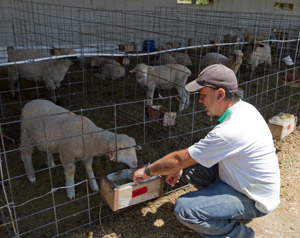Pasture As Pharmacy
Sheep grazing in a pasture seem like the definition of a simple, pastoral scene. But that pasture is more than just a sheep dining room, it’s a pharmacy too, where sheep can be taught to select their own medicine.
 Dr. Juan Villalba, associate research professor of foraging behavior in the Department of Wildland Resources at Utah State University, and his colleagues have found that sheep struggling with gastrointestinal nematode infection – otherwise known as internal parasites (IP), otherwise known as an upset stomach – can be trained to purposely select foods that act as medicines to help alleviate what’s hurting inside.
Dr. Juan Villalba, associate research professor of foraging behavior in the Department of Wildland Resources at Utah State University, and his colleagues have found that sheep struggling with gastrointestinal nematode infection – otherwise known as internal parasites (IP), otherwise known as an upset stomach – can be trained to purposely select foods that act as medicines to help alleviate what’s hurting inside.
Tannins are secondary compounds produced by plants. They have an astringent affect that sheep are typically not fond of and can reduce the amount of forage sheep consume as well as inhibit protein digestibility. But at the right doses they also reduce the number of parasites in a sheep’s gut. A series of papers released by Villalba et al. over the past five years, most recently “Selection of Tannins by Sheep in Response to Gastrointestinal Nematode Infection” (Villalba, Provenza, F.D., Hall, J.O., and Lisonbee, L.D., 2010) in the Journal of Animal Science, describe how sheep with parasites can be trained to prefer a food with plant secondary compounds (PSC), chemicals that do a variety of wonderful things: provide plants with self-defense by limiting how much herbivores will eat; attract pollinating insects for reproductive purposes; resist water and nutrient stress, and provide ultraviolet protection.
Basically, PSC is a plant weapon and animal medicine, and for sheep suffering with intestinal parasites, PSC is just what the doctor ordered.
“With organisms from insects to mammoths, you can see them behave in the environment, trying to achieve homeostasis (internal stability),” Villalba said. “We go to the supermarket and buy nice and safe foods, but how do they protect against toxins?”
Tannins, sodium bicarbonate, polyethelene glycol, and sericea lespedeza are just some of the compounds that help ward off ailments such as IP. These findings were deduced after laboriously repeated procedures and tests.
 Villalba and his colleagues exposed lambs both with and without IP to alfalfa with tannins (AT), alfalfa being a plant that sheep thoroughly enjoy. The lambs were eventually selected down to 20. Half were provided a nutrient called Ivermectin to eradicate the PI. The other 10 weren’t provided any type of medication. Over different periods of time throughout the 37-day testing, several combinations of AT versus normal alfalfa were provided. Overall, results showed that lambs with parasites consumed more AT than the lambs without parasites, and counts of parasite eggs found in sheep feces decreased in direct relationship to consuming tannins.
Villalba and his colleagues exposed lambs both with and without IP to alfalfa with tannins (AT), alfalfa being a plant that sheep thoroughly enjoy. The lambs were eventually selected down to 20. Half were provided a nutrient called Ivermectin to eradicate the PI. The other 10 weren’t provided any type of medication. Over different periods of time throughout the 37-day testing, several combinations of AT versus normal alfalfa were provided. Overall, results showed that lambs with parasites consumed more AT than the lambs without parasites, and counts of parasite eggs found in sheep feces decreased in direct relationship to consuming tannins.
However, don’t think that the sickly sheep will always go searching for tannins. As Villalba said, while we humans enjoy Tums when our stomach is asking for it, surely we won’t go on consuming such tablets when we are feeling fine once again.
“What the animals did is like what we humans do when we have an upset stomach or heartburn,” he said. “We seek to lower our discomfort, but when it’s done, we don’t keep selecting the medicine. (The animals) seek to return to a state of homeostasis, but when the medicine is no longer needed, they have specific behaviors that respond to the end of a particular discomfort.”
Writers: Rhett Wilkinson and Lynnette Harris
Contact: Dr. Juan Villaba, (435) 797-2539, email: juan.villalba@usu.edu

